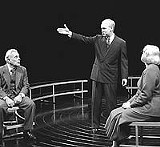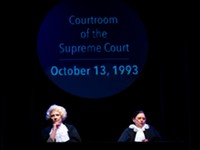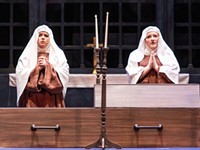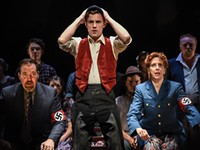[
{
"name": "500x250 Ad",
"insertPoint": "5",
"component": "15667920",
"parentWrapperClass": "",
"requiredCountToDisplay": "1"
}
]
In his prize-winning play, Copenhagen, England's popular comic playwright Michael Frayn (author of Noises Off) turned to physics to examine more literally earth-shaking matter and perhaps provide a cathartic examination of the most horrific human conflict. In fact, Frayn turned to history, and his "science-play" struggles mightily to arrive at a humanistic conclusion. Wordier than a Shaw play and close to pretentious, Copenhagen is spellbinding through masterful dramaturgy; and Geva Theater's current production holds the audience enthralled with superb theatricality.
In a fictional limbo, Frayn gathers his three protagonists after their lives are over and has them try to recall and analyze what they did and said and meant. They are real and terribly important historical figures, but as they repeatedly return to the same history, they reinterpret and re-evaluate it. Niels Henrik David Bohr, a Dane, and his younger German friend and protégé, Werner Karl Heisenberg, were two of the 20th century's greatest physicists. Both worked on atomic fission.
We know that Heisenberg, virtually the head of German atomic science during World War II, visited his beloved mentor Bohr in Copenhagen in 1941, and that after their brief reunion and a private discussion, they did not speak to each other again. Why Heisenberg made that trip and what was said remained mysterious and disputed in the accounts of both men and what their colleagues remember.
Apparently, they did discuss the possibility of using atomic fission to create a terrible weapon. Heisenberg later worked on creating a German one. Bohr escaped from Nazi-occupied Denmark and worked in the United States on the bomb that was dropped on Nagasaki. The play keeps returning to Heisenberg's 1941 visit to Bohr's house, and to significant recollected moments in the lives of both men.
The third character, Bohr's wife Margrethe, was not trained in physics. But --- a brilliant woman, her husband's confidant, transcriber of all his notes and writings, and close friend to his colleagues --- she probably understood more about these concerns than most physicists.
So Frayn has these three try to work out what they thought and felt, and then re-examine what they should have thought and felt, to answer basic questions about their relationships and roles in the history of the creation of the atomic bomb. Their interplay of memory and conflicts parallels Bohr's quantum mechanics, in large measure, and Heisenberg's uncertainty principle, I guess.
Andrew Lieberman's set of shiny metal circles and circular benches, and Michael Donald Edwards' staging of the three actors in shifting orbits within those circles, resemble an atomic model that reflects the play's volatile arguments. But, for me, the central image isn't graphically presented. It is the city of the play's title, my favorite city, a virtual symbol of civilized decency and beauty. Even in their afterlife, as they return to debate and revisit their lives and thoughts, the Bohrs and Heisenberg are basically returning to Bohr's house and the surrounding walks in that city that they loved. And the play's hopeful, imaginary conclusion is a peaceful return to humane goodwill after all those horrors, such as Copenhagen itself remained, even in occupation, during and after World War II.
Geva's splendid production is the same that Edwards staged at Syracuse Stage last season: Lieberman's set, stunning in Les Dickert's lighting, Kaye Voyce's appropriate costumes, and Jonathan Herter's arresting, stark sound design.
But the cast is new and would be hard to improve upon. Despite having played the role before, Robert Grossman had some shaky moments with dialogue on opening night, but his fatherly Bohr is empathetic and authoritative. Pat Nesbit seems intellectually and emotionally equal to the role of Margrethe, who provides not only a defining synthesis for the men's oppositions but also an admirable balance between affection and angry distrust toward Heisenberg.
Christopher Gurr's mesmerizing Heisenberg is a boyish, middle-aged genius, American in speech and manner, driven by passionate energy that is only partly intellectual. As in several previous Geva productions, actor-director Gurr provides yet another strikingly original interpretation of a role I'd expect to be played differently but am entirely happy with.
No, this play will not instruct you. Yes, it's clever, and maybe too earnest, but those aren't the reasons for its esteem. It will involve you with its characters and their dramatic conflicts enough to even care about their interminable arguments and definitions.
Copenhagen,by Michael Frayn, directed by Michael Donald Edwards, plays at Geva Theatre Center, 75 Woodbury Boulevard, Tuesdays through Fridays at 8 p.m., Saturdays at 4 p.m. and 8:30 p.m., and Sundays at 2 p.m. and 7:30 p.m., through November 16. Special matinee on Wednesday, November 12, at 2 p.m. Tix: $13-$47.50. 232-4382, www.gevatheatre.org.
Speaking of Geva, Copenhagen
-

Geva Theatre presents the real, and stolen, James Bond
May 14, 2021 -
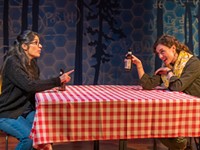
Hive-minded
Nov 12, 2019 -
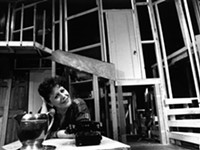
Memorial Saturday for Rochester theater icon Barbara Biddy
Jun 5, 2019 - More »
Latest in Theater
More by Herbert M. Simpson
-
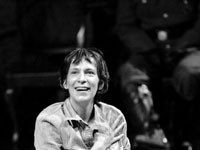
Dark, exciting final three
Sep 14, 2005 -
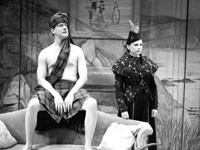
Onstage 8.24.05
Aug 24, 2005 -
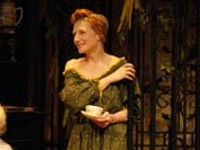
Onstage - 7.20.05
Jul 20, 2005 - More »
